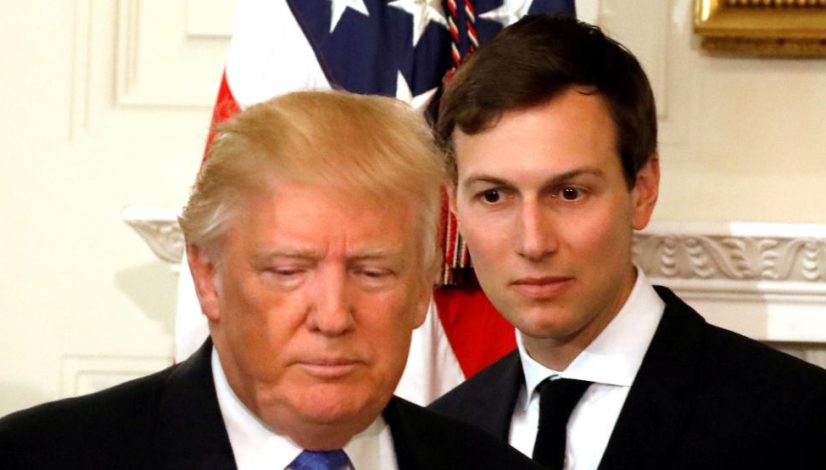The Anti-Trump Drumbeat Gets Louder As the Media Sets Its Sights on Kushner
 The savage reporting on Jared Kushner’s attempt to establish “backchannel” relations with Moscow is so vitriolic that any remaining credibility in the media is melting away like a popsicle in July. For Americans who spent Memorial Day Weekend honoring our fallen heroes and who may be confused by the torrent of speculation and innuendo again raining down upon the Trump White House, this is the latest chapter in the sorrowful End of Days for our once-proud news organizations.
The savage reporting on Jared Kushner’s attempt to establish “backchannel” relations with Moscow is so vitriolic that any remaining credibility in the media is melting away like a popsicle in July. For Americans who spent Memorial Day Weekend honoring our fallen heroes and who may be confused by the torrent of speculation and innuendo again raining down upon the Trump White House, this is the latest chapter in the sorrowful End of Days for our once-proud news organizations.
Jared Kushner, Trump’s advisor and son-in-law, is said to have proposed to the Russian Ambassador Sergei Kislyak in December that a “back-channel” or private line of communication be established between the president-elect’s team and Moscow. No such direct conduit has been proven.
Also, Kushner met in December with a senior Russian banker.
That’s it. That’s what all the excitement is about. There are several reasons that this story, breathlessly broken last week by The Washington Post, is meaningless. First, it is not at all unusual for elected leaders to reach out to foreign representatives – even those of hostile nations – to set up channels whereby non-public communications can take place. In 2008, candidate Obama dispatched retired Ambassador William G. Miller to Iran to set up secret communications. Michael Ledeen, a former consultant to the National Security Council and U.S. Defense Department, reports that Mr. Miller, who had earlier represented the United States in Tehran, was to relay a message that Obama “was a friend of the Islamic Republic and that they would be very happy with his policies.”
Presumably, Obama thought that some communication with the antagonistic mullahs might lead to a thaw, or perhaps ultimately to a deal like the one signed in 2015, aiming to rein in Iran’s nuclear ambitions. It turned out to have been a productive adventure, giving Obama his only foreign policy win. At the time, though, he surely would have been criticized for reaching out to a nation that only a few years earlier had taken 52 Americans hostage and that in the intervening period had backed terrorist organizations in the Middle East.
We now know from documents that have been declassified that Nixon’s White House began to explore private communications channels with China starting in 1970 and that Henry Kissinger secretly visited China in 1971 looking to open a dialog. The quest was to establish a bulwark against Russia and ward off a possible nuclear threat. It is hard to remember, but at the time, such overtures were risky since China was a sworn enemy of the U.S.
So it is today with Russia. But as with China, we have specific areas of mutual interest. Most importantly, we are both fighting ISIS and other Islamic terror groups, and we are also engaged in the conflict in Syria. Less than a year ago, Secretary of State John Kerry announced, standing side-by-side with his counterpart Sergei Lavrov, that the U.S. and Russia had agreed to work together in Syria to fight the al-Nusra Front, a branch of al-Qaeda in Syria, to “restore the cessation of hostilities, significantly reduce the violence and help create the space for a genuine and credible political transition” in Syria.
Of course, the outreach from Kushner, assuming the reports are true, is tainted by the clouds of suspicion that have fogged the Trump White House for months. The essential charge is that someone in the Trump campaign at some time encouraged Russian operatives to help defeat Hillary Clinton. To back up this allegation, we have:
- Representatives of security agencies concluding “with high confidence” that the hacking and release of the DNC and John Podesta emails was done by Russians.
- Michael Flynn, who briefly served as National Security Advisor, reportedly discussing a possible easing of sanctions with Ambassador Kislyak and then lying about it later.
- Various other Trump associates having business dealings with Russians over the years.
That’s about it. So far, there has been no evidence that ties President Trump or his team to anyone responsible for the release of those damaging emails. Just a few days ago, Former Director of National Intelligence James Clapper reaffirmed that there is no “smoking gun certitude evidence of collusion.” Also, there has been no indication that Moscow’s misbehavior went beyond the email dumps.
Considering that the FBI and other agencies have been hot on this trail for more than a year, and that some have engaged in apparently illegal surveillance of American citizens, and that revelations about those inquiries are leaked daily to the media, presumably if there was damning information about collusion, we would know it.
President Trump created the bedrock for the Russian narrative during the campaign by lauding Vladimir Putin. He did it intentionally, wanting to highlight the failed efforts of the Obama administration and in particular his opponent Hillary Clinton to “reset” our relations with Moscow. More than once he pointed out that better relations with Russia would be a good thing. Given our common interests, he is right.
Trump probably does admire the Russian leader on some level, since he has probably not read much about Putin’s malignant and criminal past. What Trump sees is a leader who has managed to maintain high approval ratings despite a faltering economy by being brash and unapologetically pro-Russian.
The New York Times recently ran a page one story entitled “A Constitutional Puzzle: Can the President Be Indicted?” The same day the paper carried a long piece on Jared Kushner that struggled and largely failed to portray the young advisor as anything but a trusted and respected member of Trump’s team.
My guess is that Kushner (and Trump) will survive these preposterous attacks, maybe better than the liberal news organizations that promote them. Some 42 percent of the country approves of President Trump – not a huge vote of confidence to be sure. But, only 32 percent believe in the mainstream media. The vitriol splashed across the pages of The Times and others may be paying off in a bump in subscribers, but the damage to its credibility is profound. People will tire of the assault; going elsewhere for their news becomes a lot easier when they lose respect for once-credible mainstream sources.
Published on FiscalTimes.com.




